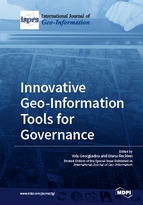Innovative Geo-Information Tools for Governance
A special issue of ISPRS International Journal of Geo-Information (ISSN 2220-9964).
Deadline for manuscript submissions: closed (31 May 2017) | Viewed by 53224
Special Issue Editors
Interests: geo-information; governance; ethics; policymaking; global South
Special Issues, Collections and Topics in MDPI journals
Interests: human-environment interactions; climate change impacts and adaptation; urban studies; urban geography; spatial equity and justice; governance and planning; volunteered geographic information; citizen science
Special Issue Information
Dear Colleagues,
In current times, highly complex and urgent policy problems—e.g., climate change, rapid urbanization, equitable access to key services, land rights, and massive human resettlement—challenge citizens, NGOs, private corporations, and government at all levels, both in the global North and in the South. These problems, often called ‘wicked’, involve multiple causal factors, anticipated and unanticipated effects, as well as high levels of disagreement among stakeholders about the nature of the problem and the appropriateness of solutions.
Given the wickedness of such policy problems, interdisciplinary and longitudinal research, rather than onetime and single-discipline studies, are required. Research that harnesses and integrates the diverse skills and knowledge of urban planners, anthropologists, geographers, geo-information scientists, economists, among others, can deepen our understanding of how different levels of government and different governance stakeholders reach consensus despite their diverging beliefs and preferences. Due to the particularly complex spatio-temporal characteristics of wicked policy problems, alternative concepts, methods and innovative geo-information tools may play significant roles. This particularly speaks to concepts, methods and tools that help to analyze alternative solutions, facilitate stakeholder dialogue, and explore possibilities, rather than prescribing a single solution.
Aim of this Special Issue
This Special Issue aims to promote innovative concepts, methods, and tools, as well as the role of geo-information to help (1) analyze alternative policy solutions, (2) facilitate stakeholder dialogue, and (3) explore possibilities for tackling wicked problems related to climate change, rapid urbanization, equitable access to key services (such as water and health), land rights and human resettlement in high-, middle-, and low-income countries in the North and South.
Topics
In line with the context and aims outlined above, we invite original research contributions on the following topics (might be extended):
- Innovative forms of governing climate change, rapid urbanization, equitable access to key public services (water and health), land rights and informal human settlements
- New and newly conceptualized governance and government tools in informal and formal governing
- Longitudinal studies on the effects of new or established governance tools and forms
- Distributional aspects of goods and services for tackling above mentioned wicked policy problems
- Procedural aspects in negotiating and deciding about potential solutions of above mentioned wicked problems, such as:
- Inclusion of under-represented groups in formal policy and planning
- Gender aspects and their inclusion in governance, policy and planning
- By the use of:
- Innovative geo-information tools and techniques
- Crowd-sourcing techniques
- Use of social media data in formal and informal governing
- Games and gaming
Prof. Dr. Yola Georgiadou
Dr. Diana Reckien
Guest Editors
Manuscript Submission Information
Manuscripts should be submitted online at www.mdpi.com by registering and logging in to this website. Once you are registered, click here to go to the submission form. Manuscripts can be submitted until the deadline. All submissions that pass pre-check are peer-reviewed. Accepted papers will be published continuously in the journal (as soon as accepted) and will be listed together on the special issue website. Research articles, review articles as well as short communications are invited. For planned papers, a title and short abstract (about 100 words) can be sent to the Editorial Office for announcement on this website.
Submitted manuscripts should not have been published previously, nor be under consideration for publication elsewhere (except conference proceedings papers). All manuscripts are thoroughly refereed through a single-blind peer-review process. A guide for authors and other relevant information for submission of manuscripts is available on the Instructions for Authors page. ISPRS International Journal of Geo-Information is an international peer-reviewed open access monthly journal published by MDPI.
Please visit the Instructions for Authors page before submitting a manuscript. The Article Processing Charge (APC) for publication in this open access journal is 1700 CHF (Swiss Francs). Submitted papers should be well formatted and use good English. Authors may use MDPI's English editing service prior to publication or during author revisions.







